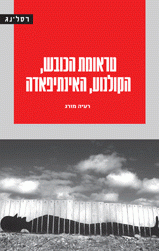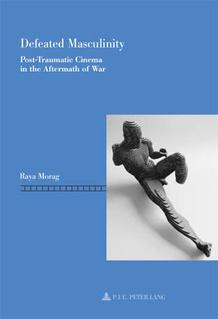Books

Morag, Raya (2022) World Movies. Thoughts about invisible Cinema, Resling, Tel Aviv (in Hebrew). 380 pages.
-----------

Morag, Raya (2020) Perpetrator Cinema. Confronting Genocide in Cambodian Documentary Columbia University Press, New York. 312 pages.
Winner, 2021 Choice Outstanding Academic Title.
Book Reviews:
Carrim, Sabah (2021) "Book Review: Perpetrator Cinema—Confronting Genocide in Cambodian Documentary," Genocide Studies and Prevention: An International Journal: Vol. 15: Iss. 2: 52–54. DOI: https://doi.org/10.5038/1911-9933.15.2.1859
Endorsments:
This compelling book will matter as long as mass atrocities persist. Focused on the Cambodian genocide, Morag addresses a new phase in how we confront such events: films where survivors confront perpetrators face-to-face. These confrontations bring the visceral truth borne directly of human encounter to the fore with consequences both intensely personal and profoundly political.
Bill Nichols, author of Speaking Truths with Film: Evidence, Ethics, Politics in Documentary.
This book is far more than an illuminating analysis of Cambodian postgenocide cinema, valuable as that is, given the Pol Pot regime’s destruction of the country’s film industry, its artists, and its entire film archive, along with 1.7 million Cambodian lives. Morag ushers us forward to view unique interactions and confrontations between first-generation survivors and top- and lower-level Khmer Rouge perpetrators, made possible by the regime’s overthrow in 1979, its remnants’ defeat and surrender in 1999, and the establishment of the UN-sponsored Khmer Rouge tribunal in 2006. The book offers front-row seats to a new genre of post-Holocaust global documentary film, with innovative approaches to the study of genocide, trauma, and gender.
Ben Kiernan, author of The Pol Pot Regime: Race, Power and Genocide in Cambodia Under the Khmer Rouge, 1975-79.
In Perpetrator Cinema, Raya Morag brings her superb intellect and expertise in trauma and Holocaust cinema to this study of groundbreaking films inspired by Cambodia's Year Zero. Morag brilliantly explores why an ethics of moral resentment undergirds the survivor-perpetrator duels in the cinema of Rithy Panh, Thet Sambath and Rob Lemkin, and Guillaume P. Suon, among others, and aptly considers films about sexual violence, among the Khmer Rouge's worst human rights abuses. Documentary scholars and South Asian cinema specialists will find much to praise in this theoretically rich, engrossing work.
Deirdre Boyle, The New School.
---------------
Morag, Raya and Duvdvani, Shmuel (eds.) (2016) Israeli Cinema EBOOK, (in Hebrew)
---------------

Morag, Raya (2017) Perpetrator Trauma and Israeli Intifada Cinema, Trans. Marianna Bar, Resling, Tel Aviv (in Hebrew). 331 pages.
Book Review:
Vinitzky-Seroussi, Vered (2018) Perpetrator Trauma and Israeli Intifada Cinema Megamot 53.2: 300-303. (in Hebrew)
---------------

Morag, Raya (2013) Waltzing with Bashir: Perpetrator Trauma and Cinema. I.B. Tauris, London & New York. 275 pages.
I. B. Tauris Publishing
Table of Contents:
Introduction
From Victim to Perpetrator Trauma
Part I: Victim Trauma
1. The Body as the Battlefield
2. Chronic Victim Trauma and Terror
3. Queerness, Ethnicity, and Terror
Part II: Perpetrator Trauma
4. The New Wave of Documentary Cinema: The Male Perpetrator
5. The New Wave of Documentary Cinema: The Female Perpetrator
6. The New Wave of Documentary Literature
Conclusion
The Perpetrator Complex
Book Reviews:
1. Bill Nichols, Studies in Documentary Film 8.1 2014: 81-85.
2. Laliv Melamed Historical Journal of Film, Radio and Television 34: 1-4.
Endorsments:
'The concept of the social 'victim' as a significant focus of the realist tradition in documentary film was first proposed in 1988 during an earlier phase of documentary film studies. It has since become something of a given. Raya Morag’s Waltzing with Bashir is a critically important further contribution arguing for a significant rethinking of this central idea. It goes beyond (but does not ignore) aesthetics to grapple with the vexed issue of the representation of extreme violence and other trauma in the documentary and elsewhere to raise the consequences of the representation of such events not only for the victims but also for the perpetrators. Waltzing with Bashir emerges from a strand of oppositional Israeli thinking which is too little known outside of the country. Morag raises issues that make the already complex questions of documentary ethics even more difficult. Such a twin agenda requires a breadth of scholarship, sensitivity and acute political understanding. She is more than equal to the task, and the book is an important addition to the literature on documentary ethics at hand. Because of its originality and the gravity of its subject, I am confident that this book will be widely noticed.'
Brian Winston, Lincoln School of Journalism, The University of Lincoln, UK
'It is time to think about the trauma of perpetrators, not because they are without guilt, but because they are the ghostly other side of the equation necessary to understanding guilt. This is an eye-opening book.'
Linda Williams, Department of Film and Media, UC Berkeley, USA.
---------------

Morag, Raya (2011) Defeated Male: War, Trauma, and Cinema Koebner Series, Jerusalem and Resling, Tel Aviv. 310 pages. (in Hebrew)
---------------

Morag, Raya (2009) Defeated Masculinity: Post-Traumatic Cinema in the Aftermath of War ("Rethinking Cinema/ Repenser le cinéma" Series ed. Dominique Nasta), Peter Lang, Brussels. 294 pages.
Book Review:
Roy Jerome, Men and Masculinities 14.4 2011: 510-511.
---------------

Morag, Raya (2012) (ed.) Special issue: "Israeli Documentary Cinema," Studies in Documentary Film 6 (3) April. 100 pages.

